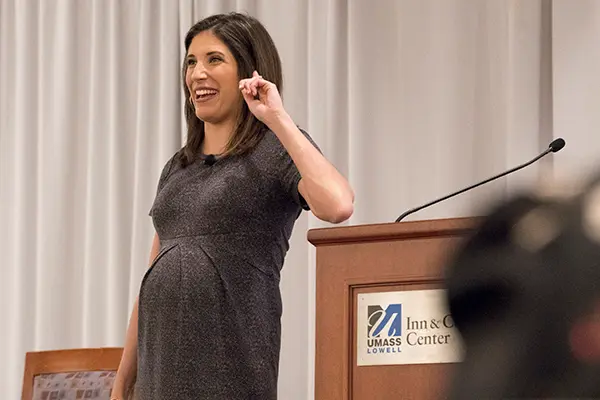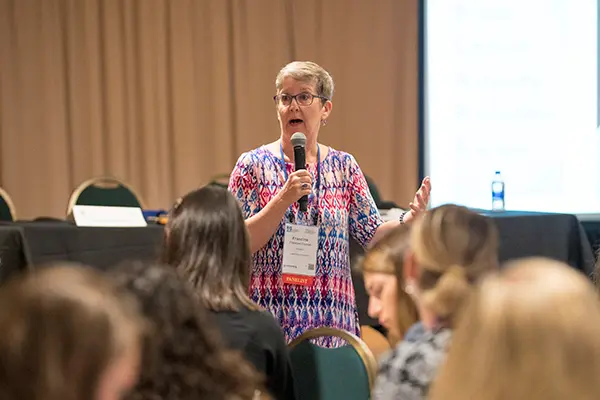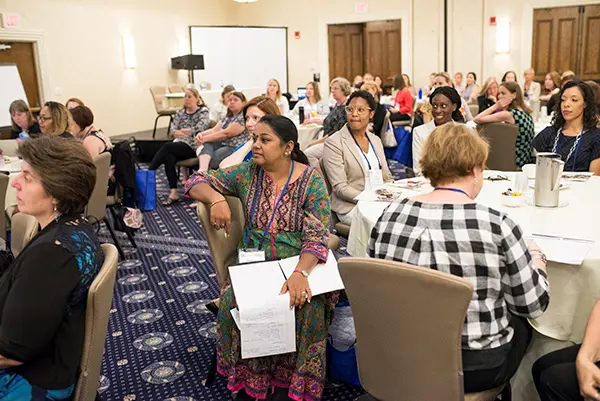Chancellor: In the Era of #MeToo, There’s Still Work to Do
 Image by Tory Wesnofske
Image by Tory Wesnofske
06/25/2018
By Katharine Webster
The #MeToo movement has brought a welcome spotlight to job-related sexual harassment and bias, Chancellor Jacquie Moloney said in welcoming a sold-out crowd to the third annual Women’s Leadership Conference.
But there’s still plenty of work to do before women achieve true equality, Moloney said.
“Women are badly underrepresented in STEM (science, technology, engineering and math) fields, in the C-Suite, in corporate boardrooms – and too many women are still shouldering the responsibility of raising their families as single parents with low-wage jobs,” she said.
While universities and companies have an important role to play in helping women achieve equity, individual women can also create change by standing up for themselves, she said.
That theme was echoed by the two keynote speakers and in several workshops throughout the day.
 Image by Tory Wesnofske
Image by Tory Wesnofske
They agreed – but she was prepared to leave if they didn’t.
“That’s been wonderful for me,” she says. “But other female meteorologists have had a more difficult time.”
Niles says she belongs to two online support groups for women meteorologists and also stays in touch with other women meteorologists in southern New England. They work together to encourage girls and young women to pursue STEM careers. The #MeToo movement is also helping to diversify the ranks of TV meteorologists, she said.
“A lot of TV stations are hiring women right now,” she said. “But once you’re hired, you need to bring the scientific knowledge and the expertise and the professionalism to continue to move forward.”
 Image by Tory Wesnofske
Image by Tory Wesnofske
Gadsby encountered bias due to her race as well as her gender. A year after graduating from Cornell University as a first-generation college student, she decided to go to New York State’s public law school in Buffalo to save money.
When a fellow student told her near the end of her first year that “Black people don’t make the law review here,” she decided she needed to leave and transfer to New York University School of Law, which had previously offered her admission.
Still, even knowing she wouldn’t stay, she applied to the University at Buffalo law review – and made it.
“If you tell me I can’t do something, I’m going to work even harder,” she said.
Gadsby also emphasized the importance of building relationships, getting involved in professional organizations and mentoring others.
 Image by Tory Wesnofske
Image by Tory Wesnofske
She is also part of a diversity initiative within Scholastic Inc., where she has worked for 20 years because she shares the company’s mission of helping kids become lifelong readers and engaged citizens. Scholastic also supports teachers and students who face greater barriers to literacy.
“I’ve felt very fortunate the past 20 years to work for a company … whose mission is totally aligned with something that’s important to me,” she said. “Those companies are out there. We have to look for them ... and not settle.”
Between the two keynotes, the sessions included workshops on how to approach difficult conversations at work and how to avoid misunderstandings by checking your own biases and assumptions, as well as how to lead effectively and mentor others.
A workshop led by two UMass Lowell faculty members, Psychology Prof. Meg Bond and Assoc. Prof. Michelle Haynes-Baratz, directly tackled the issue of workplace microaggressions – seemingly minor comments, actions or circumstances that can add up to a biased work environment.
The professors used a brief version of a bystander intervention workshop they are developing under a National Science Foundation grant aimed at improving the working environment for women and underrepresented minority faculty in STEM fields.
 Image by Tory Wesnofske
Image by Tory Wesnofske
“Microaggressions have a cumulative impact that can be macro. They can harm your mental health, they can harm your physical health and they can affect work outcomes like job satisfaction, productivity, retention and promotion,” Bond said.
Niles gave a good example earlier when someone asked about how she handles critical e-mails from viewers. The audience gasped in dismay when Niles said that most messages concern her wardrobe, including comments that a dress she wore while pregnant looked like “a potato sack.”
Niles has learned to ignore such comments, but many women in media feel pressure to blur the line between dressing professionally and looking sexy, she said.
“I’ve never given in to that,” she said. “I’ve developed a very thick skin.”




